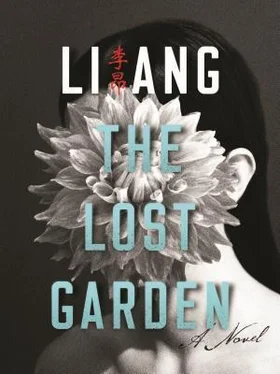“If, I mean if, someone said that Otosan was a communist, how would Otosan respond to that?”
“Why is Ayako asking such a question?” he asked, keeping his voice low. Visibly apprehensive, he looked around to make sure they were alone.
“Does Otosan remember the time when I was just a kid and fell ill from a scare by a waishengren?” To put his mind at ease, she quickly went on, “He was crying and calling Otosan a communist who was the reason they had to leave their hometown and flee to Taiwan.”
Father smiled bitterly.
“Want to hear a story?”
She hadn’t expected that, but acquiesced with a nod.
“I heard this story when I was in prison. An especially patriotic soldier who came from one of China’s backwaters saw his very first electric light when he was stationed at a new place. Being obsessively loyal, he was always vigilant against anyone who harbored ill will toward the country.”
Father continued in Japanese, as always, but now with a detectable hint of sorrow.
“Shortly after the soldier began at his new post, he noticed that every day at dusk, across from where he lived, a light would flicker a few times and then stop, like a signal. After careful observation, he reported this to his superior and had a young student arrested.”
At this point, Father stopped; Yinghong, clearly puzzled, looked up at him.
“It turned out that the flickering light, which was mistaken by the soldier as a secret code to the enemy, was caused by the student turning on the light to study.” He added, “Back then, electric lights always flickered a few times when you turned them on.”
Father’s weighty gaze shifted to the scene outside the window, reminding Yinghong of the worry-laden face that kept recurring in her dream, a look of profound concern mingled with compassion and pity.
“Otosan …”
She wanted to say something but no sound emerged, as the recollection of Father upon his return flashed through her mind.
He had likely returned in the spring. Yinghong recalled that not long after he came home she started going to the neighborhood Number Three Elementary School, a schoolbag over her shoulder.
She’d been playing in Lotus Garden when Mudan found her. Back then Mudan called her Ah-hong. “Ah-hong, Ah-hong!” Mudan was running as she called her out of frustration, making her name sound more like hurried breathing. Yinghong wasn’t having much fun playing alone, so she stepped out from behind a Yinghong Pavilion pillar. Mudan grabbed her arm and dragged her toward the Upper House. Yinghong was wearing Japanese geta, whose wooden soles knocked crisply against the garden’s flagstones. The heels made running difficult, and she had to struggle to keep them on, but they were her favorite red clogs and she refused to take them off.
She heard a din in the Upper House when they drew near. Mingled with sounds of footsteps were whispered comments like “get the sacrifice ready,” “offer up the incense,” and “pig’s feet and rice noodles.”
When she entered the main room, which had always been dark and gloomy, she saw that the dozen or so formal armchairs on both sides of the room were all taken. Women were standing to the sides, while serving women were shuttling back and forth. And yet the room was deathly quiet. Mudan led her forward, where she heard her mother’s soft, tender voice:
“Say ‘Papa.’ Papa’s back.” Her voice quivered.
She did what she was told, but kept her head down.
Then someone came up to help Father out of his chair. In what she could see with her head down, she spotted a pair of geta in front of the armchair’s horse-hoof feet. They were the wooden clogs Father had always worn at home, Japanese-style, some three or four inches high. Moving slowly down into the clogs were two ghostly white feet so thin they were virtually shapeless, and so weak he fell forward before they reached the clogs.
Yinghong jerked her head up and saw Father’s face. Over that puffy, deathly ashen face lay a profound melancholy, so sorrow-laden it kept appearing in her memory from that day on.
Father was laid up in Flowing Pillow Pavilion. She could not get in to see him for the longest time, and all she saw was Mudan going in and out with an enamel basin filled with water.
They owned several enamel basins like that, with similar patterns. Mudan used one of them to bathe her.
The thick white enamel, which had the look of spilled condensed milk, was spread evenly over the surface, a solid, opaque white. A large bouquet of hand-painted red flowers adorned the bottom of the basin — layer upon layer of bright red petals interspersed with orange stamens and highlighted by a few green leaves. The flowers seemed to dance in the ripples when water was poured over them, and appeared to float up to the surface, at which moment she would step on them so they would stop moving and stay at the bottom, where they belonged.
She always had secret thoughts of her father when she did that. His enamel basin had the same red flowers, making that basin her only concrete connection to him. For some peculiar reason, she was convinced that with her feet on those red flowers she could keep him around. But in no time she’d be frightened by the possibility that the flowers, though solid under her feet, might disappear completely, so she’d remove one foot and see, in the rippling water, the flowers floating at the bottom; then she’d hastily step on them again, now with a sense of relief over having verified that they were still there and that she had the power to keep them there.
Father was laid up for more than two years, during which Yinghong secretly continued to repeat her foot ritual. Sometimes, when Mudan was occupied with other chores and forgot to get her to finish up, Yinghong would leave her feet in the water for as long as two hours, even in the depth of winter, long after it had turned icy cold.
Over the years that followed, up until she was a third-grader and wrote “I was born in the last year of the First Sino-Japanese War …,” she often saw Father, who was on the mend. But she was constantly plagued by the deeply affecting fear that she’d be awakened late one night by unidentified noises, then get up the next morning and never see him again. Then, after a long time, he would return and yet she still couldn’t get to see him; his somber, worry-laden face alone kept reappearing in her dreams.

The next time she met him was at a similar social event for Taipei’s businessmen at a piano bar called “Elixir.”
It was more of an accidental meeting.
As Elixir was one of the few bars without hostesses, Yinghong’s uncle recommended the place to his friends for an after-dinner drink and chat. When they got there, Lin Xigeng was already drinking with his friends in the largest room. So after brief greetings, the two groups joined up and sat together.
Socializing for Taipei businessmen followed a typical formula — an early evening dinner, say, around 6:30, leaving plenty of time for after-dinner entertainment. Dinner was open to all, men and women, but after dinner, the women excused themselves if the men had other plans.
If only men were invited to dinner, then women from the entertainment industry were hired and the guests drank, flirted, and made plenty of noise at dinner. But no matter what the format, the host was considered inadequate if they stayed at one place all night; they had to go to a drinking establishment or piano bar afterward.
Wherever they went, they carried on pretty much the same, drinking, playing finger-guessing games, singing karaoke, dancing, and flirting. Come late night, the men would take the girls, now off duty, for a midnight snack, after which they could decide on their own what to do next. They hardly ever took the girls home; most likely their final activity of the night would be going to a hotel to “rest.”
Читать дальше













